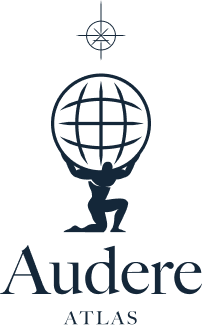
Tags
Share
India’s Opportunity & Cost
Happy New Year and welcome to the Audere Atlas, the Audere Group’s fortnightly update on global geopolitical trends, how we engage with them, and what they mean for your organisation.
The focus of the first issue of 2025 is the potential of the Indian market. It is one of the fastest-growing economies and largest consumer markets in the world, but doing business in India is not without risk. Despite reforms, a history of protectionism has made for a dauntingly unpredictable Byzantine regulatory framework, while corruption issues persist within a complex legal environment. Making the most of the opportunity in this context is no easy task.
The Audere Atlas offers timely, actionable insights that both support key decision-making and highlight areas for further exploration and understanding.
Business on the Subcontinent
The Bottom Line
India vaunts a rapidly growing economy with a large, youthful population and thriving sectors spanning technology to pharmaceuticals. Structural reforms, rising middle-class consumption, and ambitious infrastructure projects have made it a global investment destination, bolstered by Modi’s business-friendly policies and its strategic and geopolitical significance. Yet challenges, including bureaucratic complexity, protectionist policies, corruption, and inconsistent enforcement, persist, requiring companies to navigate carefully to capitalise on opportunities in this dynamic market.
The Brief
India is, plainly, an economic powerhouse on the rise. A market of one and a half billion people, half of whom are under 25, it is the world’s fastest-growing trillion-dollar economy. It overtook the UK economy in 2022 to become the world’s fifth largest in GDP terms.
With such impressive demographics, India’s growth journey since the 1990s may appear in some ways preordained. During his first budget speech in 1991, former Indian Finance Minister and two-term Prime Minister Manmohan Singh portentously stated that “no power on Earth can stop an idea whose time has come.” Yet far from inevitable, it took Singh’s reform agenda to lift the Indian economy from crisis in the early 90s. This reformist legacy has been continued by Narendra Modi and his Bharatiya Janata Party (BJP), with recent years seeing growth rates of between four and nine per cent. Structural reforms, government investment, and rising private consumption have all played their part.
While the opportunity is immense, businesses entering India often face significant challenges. Bureaucratic and regulatory complexity can prove daunting, especially when it comes to India’s convoluted taxation laws. In 2013, Nokia faced a significant tax dispute with Indian authorities, who claimed the company owed substantial taxes on software downloads to devices manufactured in India. This led to the freezing of Nokia’s assets in the country, complicating its operations and contributing to delays in its acquisition by Microsoft. Such examples underscore the need for local expertise to navigate the labyrinth of regulations effectively. Market entry strategies tailored to India’s diverse and fragmented economy are critical to avoiding such costly missteps.

The country is also a global leader in technology and innovation. Industry giants like Tata Consultancy Services, Infosys, and Wipro drive growth in IT and telecommunications, while its pharmaceuticals sector plays a key role in global healthcare. Yet intellectual property (IP) protection remains a concern. Despite alignment with international standards on paper, bureaucratic delay scan undermine the enforcement of IP rights, posing risks to technology and pharmaceutical companies. Effective IP risk mitigation strategies, including proactive legal support, are essential for businesses in these sectors.
India’s burgeoning middle class is another reason for optimism, with total consumption expenditure projected to reach $6 trillion by 2030, cementing its status as one of the world’s largest consumer markets. However, infrastructure gaps remain an obstacle. Poor road conditions, unreliable power supplies, and congested ports frequently stymie supply chain operations. Manufacturing firms have faced unforeseen costs and delays due to these bottlenecks, highlighting the importance of comprehensive supply chain audits and risk assessments.
India’s infrastructure development is nonetheless a promising avenue for investment. Ambitious public-private projects aim to address critical gaps in transport, logistics, and urban planning, with initiatives like the India–Middle East–Europe Economic Corridor set to reshape global trade flows. However, the government’s protectionist stance can complicate foreign participation. High import duties and restrictions on foreign ownership, as experienced bye-commerce giants Amazon and Walmart-owned Flipkart, illustrate the challenges posed by policies designed to shield domestic industries. Policies preventing these companies from owning inventory and mandating data localisation have forced them to restructure their operations, impacting their business models and investment strategies. Companies must adapt to these regulations, often requiring localisation of supply chains and operations to comply with Indian laws.
The problem of extreme weather and political violence adds another layer of complexity to doing business in India. Extreme weather events, such as monsoonal flooding and heatwaves, can disrupt supply chains and damage critical infrastructure, leading to operational delays and increased costs. Labour-intensive industries, such as agriculture and construction, are particularly vulnerable to these disruptions. Political violence, while sporadic, can also affect regional stability and business continuity. Strikes, protests, or localised unrest may disrupt operations, especially in politically volatile regions. These risks highlight the need for businesses to develop contingency plans and monitor geopolitical and environmental conditions closely.
Foreign investment in defence, energy, and infrastructure continues to grow, supported by India’s strategic partnerships, particularly through its membership in the Quad alongside the US, Japan, and Australia. Yet businesses must remain vigilant about corruption, which, while declining, persists as a challenge. Patronage networks create barriers for new entrants, while “fixers” offering to expedite deals can lead to legal and reputational risks. General Motors’ exit from India in 2017 serves as a cautionary tale, with inconsistent regulatory enforcement contributing to its challenges in the market. Robust due diligence and investigative support are essential for navigating these opaque practices.

Mitigating Risks: A Strategic Approach
Navigating India’s complexities requires more than just recognising its vast opportunities; it demands precision, insight, and the ability to manage risks effectively. Companies can benefit from services offered by Audere, which equip businesses with tailored techniques to address these challenges.
1. Market Entry Strategies: India’s diverse and fragmented landscape requires more than a one-size-fits-all approach. Tailored strategies that consider political, economic, and cultural dynamics can optimise entry outcomes and reduce risks.
2. Supply Chain Resilience: Comprehensive audits and risk assessments help businesses build robust supply chains capable of withstanding disruptions from labour disputes, extreme weather, or infrastructure bottlenecks.
3. Litigation and IP Protection: Businesses must prepare for long contract enforcement timelines and challenges in protecting intellectual property. Pre-litigation analysis and proactive legal strategies can expedite resolutions and secure valuable assets.
4. Corruption Risk Management: Investigative services that uncover conflicts of interest or fraudulent activities allow companies to make confident, informed decisions while avoiding legal and reputational pitfalls.
India’s economic promise is undeniable, but its challenges demand a strategic, informed approach. By intertwining opportunities with an understanding of risks, companies can build resilience and drive sustainable growth. With Audere’s expertise, businesses can be better equipped to thrive in one of the world’s most dynamic and rewarding markets.
Keen to know more?
The Audere Group is an intelligence and risk advisory firm offering integrated solutions to companies in complex situations.
We specialise in mitigating the financial, reputational and physical risks faced by our clients in markets across the world through a 360-degree range of services incorporating security advisory, crisis management and strategic intelligence to inform decision making around transactions, supply chains and disputes.
Contact us to learn how our bespoke risk advisory services can work with your unique circumstances to navigate high-risk environments and changing landscapes through the provision of hard-to-reach intelligence and clear analysis.

Disclaimer: The content of this report is for informational purposes only and does not constitute legal or financial advice. For further details or specific inquiries, please reach out to our team directly.





